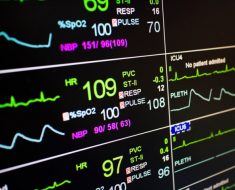This Morning: Type 2 diabetes can be 'devastating' says expert
We use your sign-up to provide content in ways you’ve consented to and to improve our understanding of you. This may include adverts from us and 3rd parties based on our understanding. You can unsubscribe at any time. More info
Type 2 diabetes usually goes undetected until blood sugar levels are raging. When this happens, the body undergoes serious and potentially catastrophic changes. To ward off the threat of serious complications, blood sugar levels must be tamed.
According to Cheryl Lythgoe, Matron at Benenden Health, some of the complications caused by consistently high blood sugar levels can be “irreversible”.
“Diabetes is currently considered an international pandemic, and there can be serious, irreversible side-effects of not controlling your sugar (glycaemic) levels,” warned Ms Lythgoe.
As she explained, diabetes itself (both types 1 and 2) affects the whole body, so there are many complications that come from not maintaining a healthy glycaemic control.
Among the most devastating is Alzheimer’s disease – a progressive disorder that causes the brain to shrink (atrophy) and brain cells to die.

According to Ms Lythgoe, diabetics are twice as likely to develop Alzheimer’s.
She explained: “This risk is increased with poor glycaemic control and is thought to be connected to the small blood vessel damage that occurs with high sugar levels.”
Furthermore, “we also have small blood vessels within the eyes and those vessels can, and will, become damaged through high glucose levels and high blood pressure”.
As Ms Lythgoe explained, this leads to retinopathy and could, if not detected and treated, lead to blindness.
DON’T MISS
Type 2 diabetes: Craving three types of food is a sign [ADVICE]
Lionel Richie health: Singer on mysterious illness [INSIGHT]
Cancer warning: Three supplements increasing risk [ADVICE]
Other irreversible risks
“The challenge that we often have with our vascular (blood) system is that it feeds our entire body, so any damage to the small and large vessels will cause problems.”
In fact, Ms Lythgoe said that heart disease, heart attacks and stroke are five times more likely to occur in those who have poor diabetic control.
Approximately 40 percent of people with diabetes also develop “nephropathy”, she said.
This is where the kidneys do not filter as effectively and may result in the need for dialysis or a kidney transplant.

According to the expert, poor glycaemic control affects many of the major organs of the body.
“Unfortunately, it also affects how the body responds to infection and manages pain.”
She continued: “From the increased risk of non-healing wounds to the increased prevalence of bacterial infection, our body’s ability to fight and clear infection decreases with poor glycaemic control.
When we combine that with the nerve damage that occurs, causing us not to notice some common symptoms of infection, we are certainly increasing our risk of becoming very unwell.

“To avoid increasing your risk, it is crucial to maintain a healthy glycaemic control, which can be accomplished through actively addressing your lifestyle and using medication as prescribed.”
How to respond
According to the NHS, you should see a GP if you have any of the symptoms of type 2 diabetes or you’re worried you may have a higher risk of getting type 2 diabetes.
“A GP can diagnose diabetes. You’ll need a blood test, which you may have to go to your local health centre for if it cannot be done at your GP surgery.”
Benenden Health offers high quality, private healthcare at the same affordable cost for everyone.
This includes round the clock care such as 24/7 GP and Mental Health helplines, plus speedy access to services such as physiotherapy and medical treatment.
Source: Read Full Article





